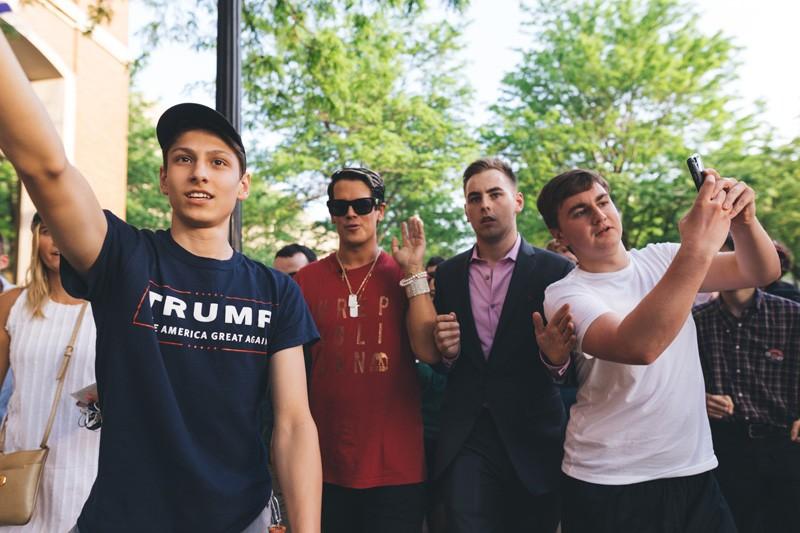
[dropcap]T[/dropcap]om Ring grew up in Madison, Georgia, a rural town with a population just under 4,000. Ring, a freshman, moved to Chicago in part to get away from the deep south. Throughout his life, Ring said he saw members of the Ku Klux Klan handing out flyers and even had a friend of Indian heritage targeted by the Klan, who left stones and bricks in front of house with notes of intimidation on them.
And so when Ring heard the report of a noose found on campus, it struck a nerve.
He went to Facebook and posted a message that condemned the act, writing that the campus was unified and telling whoever dropped it to “get the hell out.” The post garnered 443 likes and was shared 33 times.
“When I came to college, I was naive that I could escape racism,” Ring said about his post. “It was definitely some level of disappointment for DePaul, that DePaul had let me down. I kind of realized that racism is everywhere.”
The reports of a noose being found is just one of the many developments since last Tuesday when protests erupted on campus from the visit of the controversial conservative speaker Milo Yiannopoulos, shutting down the Student Center and creating a charged atmosphere that left many students feeling unsafe.
But while opinions of the event are sharply divided, many are upset with the university’s perceived lack of action — ranging from Public Safety’s reaction to the tone of the Yiannopoulos event to an apology issued to the College Republicans from DePaul president Rev. Dennis Holtschneider, C.M., to its response to the situation.

How the event lost control
Yiannopoulos’ visit was no surprise. College Republicans began soliciting donations through GoFundMe for the event in April and soon after created an event page on Facebook for people to RSVP for people to hear Yiannopoulos speak at the Student Center. And according to Nicole Been, president of College Republicans, planning for the event was months in the making.
The plan called for College Republicans member John Minster to interview Yiannopoulos for about 20 to 30 minutes and then open the floor for audience questions the remaining hour. But this was not to be, as Yiannopoulos was interrupted by DePaul alumnus Edward Ward and other student protesters inside the event.
“We had three tiers of people (ready to respond) that when something would happen: first it would go to one-tier, which was us I believe, then it would go to administrators, then it would eventually go to security,” Minster said. “And the third tier, if it got there, would be to remove people. So, in this case, when we had people threatening to assault Milo, we had people stalking the stage, we had people taking the mic from me, when we had that type of thing happening, that breached tier three immediately.”
University administrators told Been to announce that the Chicago Police Department (CPD) had been called and that anyone on the stage besides Minster and Yiannopoulos would be arrested.
But Been, other members of College Republicans and attendees are upset that Public Safety chose not to intervene.
“I put more fault on the university beause they easily could have prevented it,” Been said. “They knew this protest was happening. Arrests could have easily been made and the event could have gone on, but they didn’t want to do that for whatever reason.”
Director of Public Safety Bob Wachowski said that Public Safety’s goal was the preservation of peace.
“You must have witnessed and felt the same tension we did,” Wachowski said in an email. “Our goal was not to have protesters arrested, or any others who may have been stirring things up, though we were prepared to sign complaints and have Chicago Police make arrests.
“Our goal was to preserve the peace, in other words, do all we could to prevent a melee, a riot, serious injuries or worse. We were using our professional judgment in consultation with Student Affairs to determine our action.”
Been, in particular, said that they were upset because of a last minute quibble between her group and university officials. Been said three or four days before the event that her group received emails from the Office of Student Involvement (OSI) that required 20 contracted security guards for the event when the two groups agreed upon nine.
After negotiating, College Republicans and the OSI agreed upon 15 security guards, but the additional cost of the extra security was $840. Yiannopoulos said that he was going to cover the cost, but Vice President of Facility Operations Bob Janis said that no one had yet to be invoiced for the event.
Because the event was canceled for safety reasons, the university will pick up the cost of security, according to Gene Zdziarski, the vice president for Student Affairs. University officials also said once Yiannopoulos and his supporters chose to leave, the event officially ended and the decision to close the Student Center was made as another safety measure.
As for why police did not intervene, Wachowski said that when CPD is called, Public Safety has the authority to request if arrests are made or not. When Police arrived, they entered the Student Center and the crowd chanted “CPD,” waiting for action. The police, however, remained still, further inciting the crowd.
It was Public Safety’s decision to not step in and remove protesters.
“Please understand that this was a campus event, on campus property, and the responsibility for security was under Public Safety, Facility Operations and Student Affairs. CPD was standing by to make arrests if we needed them to,” Wachowski said. “We had several strategies in place and as the scene unfolded, Public Safety and Student Affairs used professional judgement to act accordingly.”
With weeks to plan a counter response, opponents of the Yiannopoulos event petitioned the university to cancel the event. This effort wasn’t successful despite receiving nearly 500 signatures. Because the event was permitted by the university, anti-Milo students decided to organize a demonstration in the Quad.
This peaceful demonstration would turn rowdy and chaotic, eventually leading to the scene outside the event in the Student Center and later once again in the Quad.
Protest organizer Tom Rietz said it was important to create an outlet for students to express their opinions on the event, which was attended by around 100-150 people.
“A lot of people had been telling me, ‘oh, 30 people are going to come’, ‘it’s not going to be a big thing’,” Rietz said. “But other people were kind of wary about what was going on, especially with the events leading up to it with the petition and some of the promoting the Republicans did and their reaction to that.”
The plan called for students to assemble in a “peace circle” in the middle of the Quad. There, according to Rietz, introductions would be made, speeches would be given, posters would be built and organizers would explain why they were protesting the event.
The plan was for students to eventually march from the Quad to the Monsignor John J. Egan statue outside the Student Center, where more words would be shared and the protest would eventually disperse. Yet several protesters asked organizers to march earlier than planned in order to be in front of the Student Center when the Yiannopoulos event started. Rietz and other organizers agreed.
“I knew there was going to be a lot of different opinions on how to react and I tried to include as many as I could into the event I had planned,” Rietz said. “But, obviously, people kind of took it upon themselves to do more. And the moment where my event ended and the disorganization began was when people entered the Student Center.”
The atmosphere prior to entering the building was charged as several students were provoked by a conservative journalist from the website RebelPundit.com – who mocked “safe spaces,” among other things – and was eventually arrested.
Contrary to Rietz’s initial plan, protesters entered the Student Center and chanted outside the doors of the event. Once Ward and others inside the event took the stage and interrupted, Yiannopoulos led his supporters outside, convening with Rietz’s group.
This, along with the sheer mass of the crowd, made it difficult to control.
“A lot more people came and a lot more people were riled up,” Rietz said.
Rietz criticized the university administration and student leaders for not promoting student discussion on the topic sooner.
“I think it’s obvious that the intentions that I had didn’t meet up with the expectation and the implications later,” Rietz said. “ And I admit that and I take full responsibility for that.”
“There’s so much more involved than just the organization of the protest itself that factored into this,” he said. “It’s emotions, it’s a political environment in an election year that’s very, very contentious, and I think that when you combine that on top of a student body that doesn’t feel like it’s being listened to, then you get outbursts and people acting out and it’s not a healthy campus environment in some ways.”
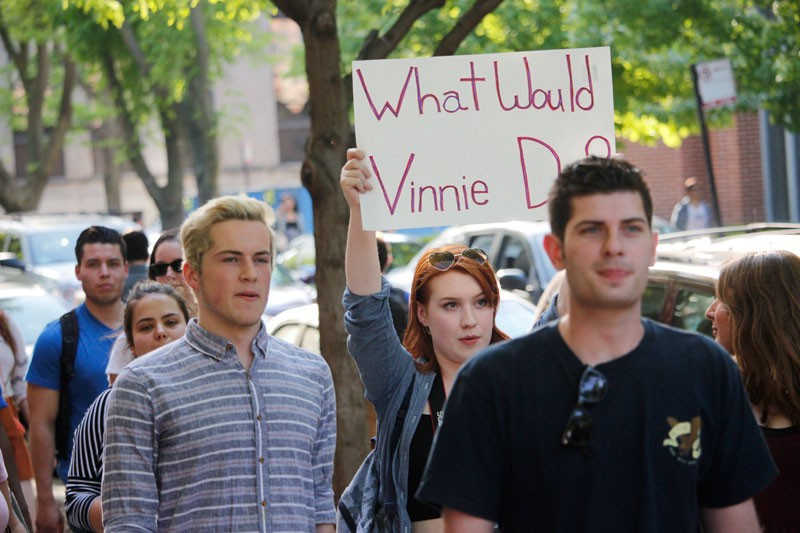
Where DePaul goes from here
In his letter addressed to the student body Wednesday, Holtschneider said DePaul had some “reflecting and sorting out to do.” At the time of his email, Holtschneider was in France with members from the Board of Trustees.
“Student Affairs will be inviting the organizers of both the event and the protest — as well as any others who wish — to meet with them for this purpose,” Holtschneider said. “I’ve asked them to reflect on how future events should be staffed so that they proceed without interruption; how protests are to be more effectively assisted and enabled; and how the underlying differences around race, gender and orientation that were made evident in yesterday’s events can be explored in depth in the coming academic year.”
Holtschneider also apologized to the College Republicans because “they deserved an opportunity to hear their speaker, and were denied it.”
While Been said she accepted Holtschneider’s apology, she said she was skeptical in the potential change that could come from Holtschneider’s letter. She and her fellow Republicans seemed surprised at the proposed meeting as well.
“We aren’t being forced into this meeting, but we never asked for it either,” Been said. “As far as I’m concerned, Black Lives Matter isn’t a registered student organization and we are. So to say that, us, we’re going to be forced into this meeting or whatever, was just a little concerning and strange to me, making it seem like there’s discourse and dialogue that’s going on, but there really isn’t.”
Ward said he would be open to meeting with Holtschneider with his fellow protesters in the next two weeks.
“There are lists of demands that people may have,” Ward said. “I’ll leave that at the discretion of the group.”
He said he’d be open to meeting with College Republicans as well, as long as someone from the university was there too.
“A lot of people get this confused, this is not a battle between two groups,” Ward said. “We are disappointed in the university … for allowing someone who openly bullied students on DePaul’s campus and to have a platform to speak, someone who is obviously inciting not intellectual thought, but hatred and essentially violence.”
Rietz said he felt like Holtschneider’s email didn’t address why protesters were protesting in the first place, and that there was violence on both sides.
“I’d also like to see an emphasis in the top-down sense from the university to facilitate a community dialogue, and maybe do it in a very public place where students can talk it out,” Rietz said. “It’d not only be a space for people not only to say what they’re thinking, but to be listening too. I think if the university can provide a space where students feel listened to, where their grievances are taken into account. I think that’ll be a step forward.”
Other groups on campus also criticized the university’s responses to the event. On Friday, the campus group Feminist Front called for Holtschneider’s resignation.
“You have shown us that you do not support marginalized communities and that instead of eradicating institutional violence on our campus you continue to encourage it,” a statement from the group said. “We demand that you immediately resign, apologize to the marginalized students you neglect, and admit your wrongdoings and complicity in this systemic, institutional violence.”
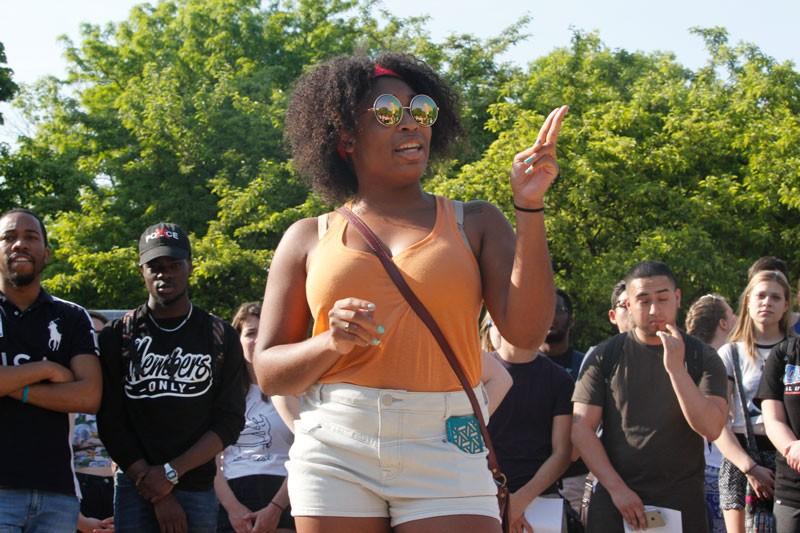
DePaul Democrats also hinted at a leadership change, saying that if Holtschneider fails to act that “it will become very clear that he is unable to stem the tide of hatred and bigotry that is rapidly engulfing our campus.” Groups like Black Student Union and the Women and Gender Studies program also rejected the letter.
On DePaul’s end, the university said in an email Saturday that they will “share remedies” for the upcoming week. In the meantime, Zdziarski and provost Marten denBoer said that there are additional Public Safety patrols on campus grounds and an escort service has been expanded to 24 hours for those feeling unsafe.
For senior Kiara Farmer, she said she has felt unsafe at DePaul in recent months and wishes the university would have done more in its response to pro-Trump chalkings on campus in April.
“More needs to be done so I can feel safe and to feel as an alumni, I can encourage more people to be here,” Farmer said Tuesday. “Before I was a freshman, people told me DePaul is a safe place and that they really cared about their students. Right now, I don’t feel like DePaul is safe and that it cares about its students.”
The email also said that Student Affairs staff would be more visible and that information tables will be set up in the Lincoln Park and Loop campuses from 10 a.m. to 2 p.m. on Tuesday, Wednesday and Thursday.
“The goal is to be actively accessible to students with questions, concerns or feedback,” the email said.
However, staff in the Student Center were told to stay quiet on the issue when working in an email sent to the student employees.
“From this point forward, there is to be no discussion or commentary about Tuesday’s Milo Yiannopoulos event while you are at work,” the email said. “This includes discussions with co-workers, others in the building, other students, reporters, etc). You are free to comment or discuss from your viewpoint as a student, on your personal time when not working, but may not discuss anything while you are at work.”
“While you are working, and wearing a DePaul Student Center polo or fleece, you represent the Student Center and DePaul University as a whole; and anything you say could be misconstrued as an ‘official’ comment from DePaul University or the Student Center,” the email said. “Controversial events like this have many viewpoints, and many people looking to propagate information; and a seemingly innocent comment that is taken in the wrong way could have unintended and possibly disastrous consequences for you, your supervisors, and the Student Centers department.”
The university said it is still investigating the “volatile” events of Tuesday, online and phone harassment of students, faculty and staff, profane leaflets found in Arts and Letters Hall and the noose found on campus.
Until an investigation is revealed, many are waiting to hear the fallout from Tuesday’s events.
“I think people are just tired and want to move past this,” Ring said. “They feel like this is an embarrassing moment for them and their school, and I feel like that too. I feel like our school could have done much better handling the situation.”



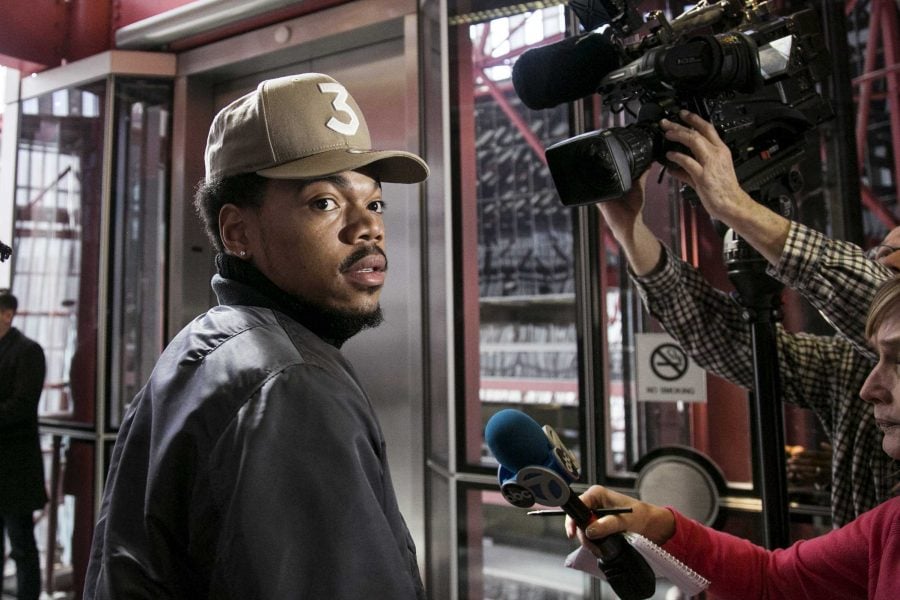
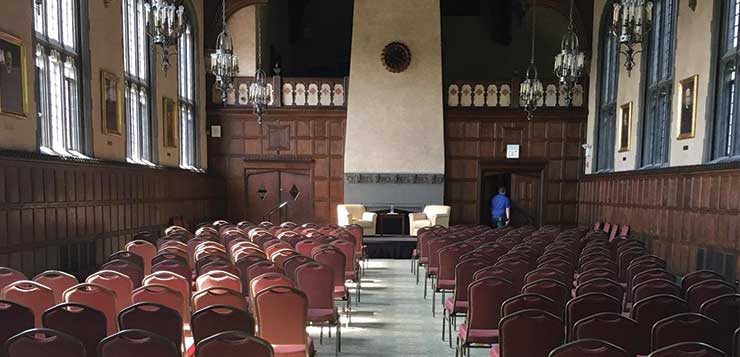
maxime1793 • Jun 2, 2016 at 7:20 pm
You people are totally crazy.
Jon Korpas • Jun 2, 2016 at 6:04 pm
These protestors were nothing but thugs who threaten people instead of challenge the ideas. The president and those in charge of student safety shoulf all be immediately fired. The girl who rushed the stage should also be expelled, and the graduate who threatened Milo should be arrested for assault.
Nick Hortense • Jun 1, 2016 at 12:06 pm
Until faculty take a stand against these anti-free speech SJWs this will continue to happen. Unfortunately, they are all too scared of their students. The left is eating its own.
maxime1793 • Jun 2, 2016 at 7:22 pm
Instead the article keeps interviewing crazy people mad at the admin for LETTING the speech (theoretically) go forward
Svengali_In_Platforms • May 31, 2016 at 10:57 pm
Welcome DePaul to the hysteric shrills that brought down Mizzou. There was no noose, it was a rope from a tree or furniture. It was proven days ago but the hysterics of media and race baiters have to push the lies to push their internet celebrity, the new celebrity. Fortunately the time is running out for the idiots running the asylums, the tide has turned and there’s a great push back to delusionals masquerading as virtue.
IskurBlast • Jun 1, 2016 at 11:02 am
Lets not forget the poop swastika at Mizzou. A couple days after the picture was released someone found the same picture on Reddit from a post a year earlier. The media suddenly dropped the whole story rather than report the truth.
Bob • May 31, 2016 at 8:10 pm
BTW, Read the BS yourself:
DePaul Democrats:
https://www.facebook.com/depauldems/photos/pcb.538723476307655/538723429640993/?type=3&theater
The Black Lives Matter Response:
https://www.facebook.com/depauldems/photos/a.164858930360780.1073741829.162994830547190/538723389640997/?type=3&theater
Letter from the pres:
https://offices.depaul.edu/president/speeches-and-communications/2015-16/Pages/tuesday-speech-and-protest.aspx
Breitbart
http://www.breitbart.com/milo/2016/05/27/depaul-gender-studies-attack-milo-yiannopoulos-after-visit/
Change.org
https://www.change.org/p/university-force-depaul-president-dennis-h-holtschneider
Bob • May 31, 2016 at 8:08 pm
Hey! Check It Out! No Anti-Milo Posts! Why? because the nutjob Social Justice Warriors are too TRIGGERED to actually read any Pro-MIlo posts. THEY MIGHT GET SCARED!!! Let me sum this up:
Milo Attacks IDEAS.
SJWs Attack PEOPLE.
KevinHR • May 31, 2016 at 7:57 pm
When you can not have free and open academic debate, when shouting takes the place of reasonable discussion, when physical threats replaces respect, and when the school administration stands by and allows it to happen you no longer have a university. I don’t know what DePaul is but a university and place of higher learning it is not. To the “protesters” I say shame on you. To the school administration and campus security I say shame on you. To the professors who have breed this kind of student and who have encouraged this kind of action you should lose your tenure, your job, and any degree you currently hold. You no longer understand or respect academic thought. A double heaping of shame for you.
BC • May 31, 2016 at 4:30 pm
LOL I followed this closely and what I gathered is that I should not hire anyone that matriculated from Depaul.
Publius72 • May 31, 2016 at 7:57 am
Wow. «This peaceful demonstration would turn rowdy and chaotic»? So any demonstration is peaceful unless from the first second it is attacking someone physically? This is Newspeak. In accordance with the newest decree of the Mnitrue, isn’t it?
TLSmom • May 30, 2016 at 11:03 pm
This article is very biased on the events that took place. First the noose, really? A piece of rope on the ground. Not tied in a noose, but a knot used to tie stuff down, like when you are moving or holding some sort of cargo. So in other words, trash someone left behind.
Then the Milo event. Let me simplify it for you. Milo was invited to speak by a registered student group. The admin tried to do several things to prevent it, like changing the size of the room and then charging extra for security at the last minute. During the event several people were allowed to go on stage and the security, paid for by the group and Milo (who said he would pay the extra thrown on the students at the last minute) did NOTHING. Even when he was threatened by first the girl waving her fist and microphone in his face and then second by a verbal threat by the guy. I’ve watched video of many events that these snowflakes try to disrupt. It really isn’t a big deal to handle this. You don’t have to arrest them. You just have to remove them. But the security did nothing. Then the CPD came and wanted to handle the situation, but they were told to do nothing. It has been reported by the Huffington Post (a very left leaning publication) that the police stated they were prepared to handle it, wanted to handle it, but were told to stand down by the admin.
Now here is some guess work on my part. I think the admin wanted the students in attendance to do something. If any of them had tried to remove the protesters themselves you know those police would have been mobilized right away. Which is why I think Milo smartly decided to get himself and those in attendance out of the room.
It is as simple as that. All the talk about students feeling unsafe is a load of horse manure. Milo is a speaker. If these students feel threatened by words they don’t agree with, then they will not be able to handle the real world. We are creating a generation of people who will be useless in life, unable to handle even the slightest of hurdles, unable to deal with thoughts and opinions counter to theirs.
The ‘apology’ by DePaul President is the most back handed load of garbage ever written. Rambling on and on about how much he hates Milo, misstating several things Milo has said. Being completely wrong on other things he has said. Barely managing to choke out a weak apology but ending with praising the protesters and pledging to help and enable them in the future. Ridiculous. Comparing the protesters to the men who stormed the beaches on D-Day? That about made me sick to read.
Ben Ranum • May 31, 2016 at 7:56 pm
I agree completely, I actually attended the University of Minnesota event and whenever they had disrupters they were removed quickly and easily by MPD officers. Depaul could have taken care of these protesters easily and without incident; their lack of action at best shows extreme incompetence and at worst that they approve of the protesters’ methods.
I’m not going to comment on the obvious bias of the author this story or the idiocy of the people who rushed the stage, they speak for themselves. Personally, I want to know if this school gets any federal grants for research and if so, the President of Depaul should be hauled before a hostile congressional committee to explain why the government should continue funding such a flawed university.
ChicagoJohn • May 30, 2016 at 10:47 pm
Just so we’re clear on this:
The only person who was arrested, in any of this, was someone who mocked safe spaces.
Whereas the people who actually came into the event with the intention of shutting it down, who stole the microphone and threatened the speaker, were not?
And the people who are suggesting that they are threatened… are the ones shutting down the event?
Yeah.
Right.
Okay.